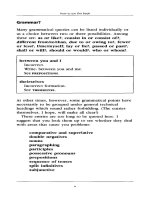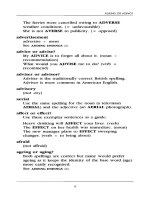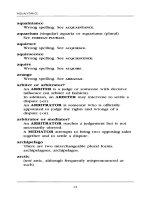Động cơ quyết định sự thành công trong việc học tiếng anh
Bạn đang xem bản rút gọn của tài liệu. Xem và tải ngay bản đầy đủ của tài liệu tại đây (65.23 KB, 3 trang )
Động cơ quyết định sự thành công trong việc học tiếng Anh
Để thành công trong việc học tiếng Anh thì động cơ và niềm đam mê học tập sẽ đóng
một vai trò quyết định, nhưng làm sao có thể nâng cao động cơ học tập, bạn vui lòng
tham khảo bài viết sau:
Improving your motivation for learning English
In this article, we share our techniques for improving your motivation for learning English
as a foreign language. We used them all the time when we were learning English and we
still use them when we need to boost our motivation in areas other than English.
Imagine yourself in the future
Imagine you can talk to native speakers just like you talk in your first language. Imagine
other people wanting to speak English as well as you do. Imagine the possibility of writing
e-mail to people from all over the world.
It is helpful to read an article about the advantages of knowing English well. There are two
such articles on Antimoon: Why learn English and English makes you feel good.
You should know that it is possible to learn English really well. Just look at other people
who have done it.
Remember that you are already good
You already know some English (you're reading an article in English right now). That's a
big success! Now it's time for more successes. Time to start using powerful methods of
effective learning. Time to gain an impressive knowledge of English.
Remember there is a lot that you don't know
You are good, but your English probably isn't perfect. You probably can't understand
English-language TV, read books in English, talk to native speakers easily, write letters
without mistakes, etc.
You should never think your English is perfect. Even if you are the best student in your
class, always try to find your weak areas and work on them. When you've learned to speak
English well, your problems will be quite small: punctuation, rarely used grammar
structures, rare words, understanding "street language". Right now, your problems are
probably more basic: mistakes in pronunciation, small vocabulary, grammar problems with
the present perfect tense and conditional structures.
Use your English whenever you can
This is very, very important. The more you use English, the more you will want to learn it.
Because English is so popular, you can use it everywhere. You can use Google to find
English-language websites with interesting information, you can watch American cartoons,
you can play adventure games on your computer, you can read interesting books in
English, or you can do other things that we write about.
If you do these things, you will not only have fun and learn English. If you see that a new
English word lets you understand your favorite TV show (or communicate with people, or
beat a computer game), you will want to learn more words. So you will learn English more,
use it more, learn it more, use it more... If you also use effective learning methods, your
English will grow faster than you can imagine.
Talk to people about English
This is a very simple method, but it is very effective. Here's how it works:
You usually talk about things which interest you. But the opposite is true, too. If you start
talking about a boring subject, you will begin to get interested in it.
Imagine you are studying a subject that you hate. You are bored and tired, but you have to
pass the test tomorrow. If there are people near you, you have two options: you can tell
everybody how much you are suffering or you can tell those people about the things you've
learned. If you choose the first option, you will only feel worse.
If you choose the second option, and start a conversation on the "boring" subject, you will
begin to look at it in a totally different way. Suddenly it will become a subject worth
talking about — therefore, an interesting subject.
How can you begin such a conversation? If you're studying English, you can surprise
another person by talking to him/her in English. Say (in English): Hi, I'm studying English
and I hate it. Or you can say (in your first language): Hey, I've learned 50 English words
today. Do you know what's the English word for ...? If there are no people near you, you
can telephone or send an e-mail message to your friend.
What will your friends say? Probably they won't be very interested, but it doesn't matter!
The important thing is this: After talking about English, you will study it with much more
passion. Try it.
Find a friend who is learning English
If you can find a friend who is learning English and is on a similar level of skill, you will
be in an excellent situation:
• you will have someone to talk about English with. These conversations will increase your
interest in English, as explained in the previous section.
• learning English will be easier, because you will be able to discuss your problems with
your friend.
• you will study English more, because you will want to be better than your friend. :-)
You should meet your friend regularly. Ideally, he/she should live near you, or go to the
same school as you. If you absolutely can't find anybody willing to learn English with you,
you can try to find somebody by e-mail. This is a worse solution: your conversations will
probably be less frequent, and it is difficult to compete with someone who you don't know
well.
Spend some money on learning English
If you spend your money on something, you will want to use it. For example, if you buy an
expensive tennis racket, you will probably go out and play tennis every day.
This rule is also true for learning English. If you want to increase your desire to learn
English, buy a new dictionary, an interesting English-language book, English-language
cable TV, etc. The idea is simple: You paid for it, so you will want to use it, and you will
improve your English.
There is a problem with this method. It only works for a short time. You usually lose your
desire to learn English after a few days. To keep learning, you would have to buy
something every week!
However, this method is helpful, because it gives you an impulse to start learning. For
example, if you buy a dictionary of phrasal verbs, you will probably learn some words
from it. Then you should try to use them. For example, write an e-mail message with these
words. This will increase your motivation (as explained before), and you will learn more.
Remember that learning English requires action
We have said this many times. One small action is more powerful than reading hundreds of
articles. Yes, we know it is very hard to do things, even if they are good for us. We humans
are lazy creatures. That is why not many people speak English well.
Still, we hope you can do the things we talk about in our English learning method — not
only read about them. You will be successful only if you change something about your life.
[st]
Don't put it off. Begin now.
Thanks









